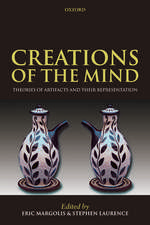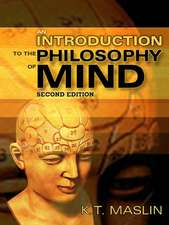The Good Life: Unifying the Philosophy and Psychology of Well-Being
Autor Michael Bishopen Limba Engleză Hardback – 26 feb 2015
Preț: 314.75 lei
Nou
Puncte Express: 472
Preț estimativ în valută:
60.23€ • 63.05$ • 49.83£
60.23€ • 63.05$ • 49.83£
Carte tipărită la comandă
Livrare economică 25-31 martie
Preluare comenzi: 021 569.72.76
Specificații
ISBN-13: 9780199923113
ISBN-10: 0199923116
Pagini: 248
Dimensiuni: 213 x 150 x 25 mm
Greutate: 0.34 kg
Editura: Oxford University Press
Colecția OUP USA
Locul publicării:New York, United States
ISBN-10: 0199923116
Pagini: 248
Dimensiuni: 213 x 150 x 25 mm
Greutate: 0.34 kg
Editura: Oxford University Press
Colecția OUP USA
Locul publicării:New York, United States
Recenzii
Michael Bishop's The Good Life: Unifying the Philosophy and Psychology of Well-Being hopefully represents a turning point in the study of well-being
Bishop (Florida State Univ.) takes a reasoned and calm interdisciplinary look at both attempts, and posits a novel bridge that can serve as a path to continued dialogue This volume is an important addition to both psychology and philosophy. Recommended.
... the most significant addition to the philosophical bestiary is Michael A. Bishop's network theory of well-being, which he defends in this important new book ... This is a marvelous book, made all the more so by its plain-spoken, good humored and concise exposition ... I heartily recommend it for anyone interested in the philosophy or science of well-being.
This is the very best sort of interdisciplinary scholarship, in service of theory that is both philosophically and empirically perspicuous. Well-being is a topic of obvious philosophical interest, and psychological research on the subject is endlessly fascinating. The Good Life is a novel and substantial contribution to a burgeoning field, and will interest a broad range of philosophers, psychologists, and political theorists. For anyone wondering about the new 'science of happiness,' an indispensable volume.
This important and engaging book brings a fresh perspective to the study of well-being. Michael Bishop proposes a new inclusive approach that takes the investigation into the nature of well-being to be a genuinely interdisciplinary venture, requiring the talents of both philosophers and scientists. Using this inclusive approach, Bishop defends an original and compelling theory of well-being, the network theory. Psychologists and philosophers interested in well-being will benefit equally from this book, which offers a walkable path out of troubling theoretical disorder and frustrating philosophical stalemate.
This is an admirable project.
Bishop (Florida State Univ.) takes a reasoned and calm interdisciplinary look at both attempts, and posits a novel bridge that can serve as a path to continued dialogue This volume is an important addition to both psychology and philosophy. Recommended.
... the most significant addition to the philosophical bestiary is Michael A. Bishop's network theory of well-being, which he defends in this important new book ... This is a marvelous book, made all the more so by its plain-spoken, good humored and concise exposition ... I heartily recommend it for anyone interested in the philosophy or science of well-being.
This is the very best sort of interdisciplinary scholarship, in service of theory that is both philosophically and empirically perspicuous. Well-being is a topic of obvious philosophical interest, and psychological research on the subject is endlessly fascinating. The Good Life is a novel and substantial contribution to a burgeoning field, and will interest a broad range of philosophers, psychologists, and political theorists. For anyone wondering about the new 'science of happiness,' an indispensable volume.
This important and engaging book brings a fresh perspective to the study of well-being. Michael Bishop proposes a new inclusive approach that takes the investigation into the nature of well-being to be a genuinely interdisciplinary venture, requiring the talents of both philosophers and scientists. Using this inclusive approach, Bishop defends an original and compelling theory of well-being, the network theory. Psychologists and philosophers interested in well-being will benefit equally from this book, which offers a walkable path out of troubling theoretical disorder and frustrating philosophical stalemate.
This is an admirable project.
Notă biografică
Michael A Bishop is Professor of Philosophy at Florida State University in Tallahassee.















